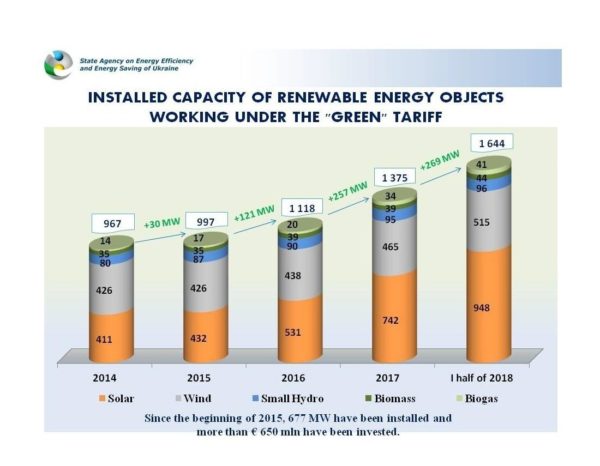Ukraine has reached an operational installed PV power capacity of 948 MW, as of the end of June 2018, according to the Head of the State Department of Energy Efficiency and Energy Saving, Sergij Savchuk.

Currently, solar represents Ukraine’s largest renewable energy source, followed by wind power with 5151 MW, small hydro with 96 MW, biomass with 44 MW and biogas with 41 MW.
In the first half of 2018, around 206 MW of new PV systems were connected to the grid in the country. This result has already reached the same volume of new PV additions that were registered in 2017, which totaled 211 MW. This means this year may become a record year for Ukraine in terms of solar growth, and that the 1 GW milestone will be likely reached over the next few months.
This good performance was mainly attributable to the €-linked FIT the Ukrainian government is currently granting to large-scale solar, which is €0.1502/kWh for ground-mounted facilities connected to the grid between 2017 and 2019.
“Under the current law, the ‘green’ tariff is fixed to the EUR by 2030 in order to avoid the inflation risk,” Savchuk stated. “The requirement for local content was also canceled, but at the same time, a premium was introduced for Ukrainian equipment usage,” he added.
The country’s cumulative PV capacity, however, does not come exclusively from solar parks. As recent statistics show, around 63 MW of rooftop PV systems were connected to the country’s grid as of the end of March 2018. According to SAEE, the growing interest for solar net metering is also due to the generous euro-linked tariff, which is being granted to the excess solar power in the grid.
The scheme, which is open to PV installations with a capacity of up to 30 kW, was introduced in Ukraine with the law №514-VIII, which was issued in April 2015.
This content is protected by copyright and may not be reused. If you want to cooperate with us and would like to reuse some of our content, please contact: editors@pv-magazine.com.




1 comment
By submitting this form you agree to pv magazine using your data for the purposes of publishing your comment.
Your personal data will only be disclosed or otherwise transmitted to third parties for the purposes of spam filtering or if this is necessary for technical maintenance of the website. Any other transfer to third parties will not take place unless this is justified on the basis of applicable data protection regulations or if pv magazine is legally obliged to do so.
You may revoke this consent at any time with effect for the future, in which case your personal data will be deleted immediately. Otherwise, your data will be deleted if pv magazine has processed your request or the purpose of data storage is fulfilled.
Further information on data privacy can be found in our Data Protection Policy.